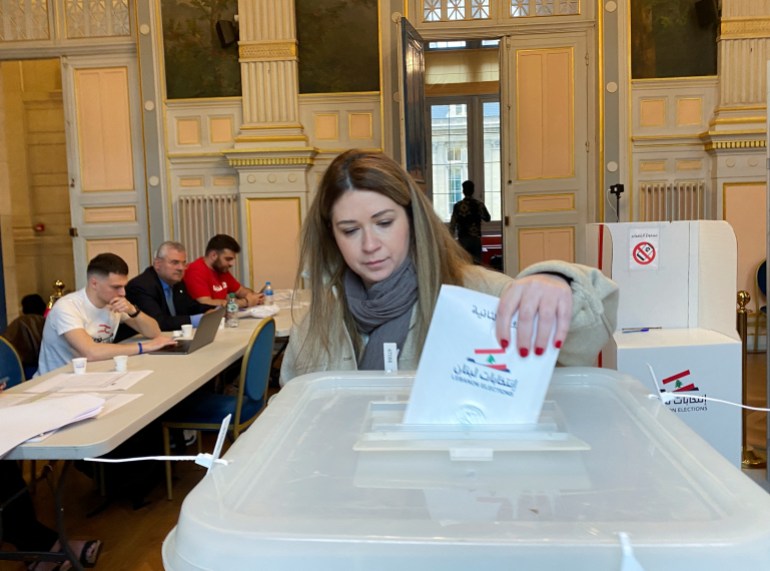The Lebanese Foreign Ministry announced that the primary voter turnout for the expatriate parliamentary elections amounted to about 60%, while the legislative elections will be held at home next Sunday.
In the current elections, 103 electoral lists comprising 718 candidates distributed over 15 electoral districts are competing to select 128 deputies.
This morning, the second phase of the elections, which included residents of Europe, Africa, Canada, Australia, the American continent, and the UAE, ended.
While the first phase, which took place on Friday, included a number of Arab countries and Iran.
More than 100,000 Lebanese living abroad voted in parliamentary elections on Friday and Sunday, and many of them backed new faces in the political arena after Lebanon experienced its worst crisis since the 1975-90 civil war that led to widespread poverty and prompted a wave of emigration from the country.
Many Lebanese participated in the elections in the French capital, Paris (Reuters)
About 225,000 Lebanese living abroad have the right to vote in more than 50 countries in the first parliamentary elections since the financial collapse of 2019 and the explosion in the Port of Beirut that killed more than 215 people and destroyed large parts of the capital in August 2020.
Hadi Hashem, a foreign ministry official, told Reuters that the total turnout in the expatriate elections was about 60%, or roughly 130,000 voters.
This is almost 3 times the previous vote in 2018.
Hope for change
For his part, Prime Minister Najib Mikati says that the citizen abroad, by casting his vote in the parliamentary elections, expressed his hope that change would occur in the country so that he could return to it.
After inspecting the election observation hall in Beirut, Mikati expressed his gratitude to the countries that embrace the Lebanese expatriates.
"God willing, through the change that the Lebanese seek at the polls, the (economic) recovery process will begin and the new parliament will be good for Lebanon," Mikati said.
He stressed the importance of "complementing the work of the new parliament and the new government in order to end the basic issues and the required reforms, so that Lebanon's renaissance can begin."
For its part, Human Rights Watch said that the new Lebanese parliament should focus on human rights issues by drawing a road map to improve the rights situation.
The human rights organization identified priority areas, including strengthening the independence of the judiciary, reforming the ailing electricity sector, and protecting rights in response to the economic crisis.
In the first 2018 elections, in which expatriates participated, their participation rate reached 56 percent, as about 50,000 people voted out of a total of nearly 90,000 who registered.
In both cases, the number of registered voters and voters is small because there are millions of Lebanese around the world.
According to a report this month published by the Arab Reform Initiative, a Paris-based research organization, 6% of voters abroad in 2018 chose candidates on opposition lists, while 94% chose candidates from traditional political parties.

